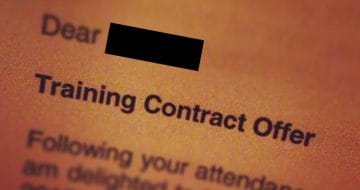Advice needed

In the latest instalment in our Career Conundrums series, an aspiring solicitor seeks readers’ opinions on the feasibility of pursuing a career in law.
“I’m a career changer and am interested in pursuing a career as a solicitor. I graduated with a non law degree back in 2020, which was graded an ‘Ordinary Degree’, a degree passed without honours. Realistically, what are my options for pursuing a career change? As an employment advisor for over three years I believe I have transferable skills to enter the legal field but my grades feel like a big blemish. I can’t go back and change them but going forwards I wanted to know if there are any law firms with no minimum academic requirements for TC’s? I wanted to also know, if any other students/career changers have been in my position before and if so what they did to enter the legal field?”
If you have a career conundrum, email us at tips@legalcheek.com.



